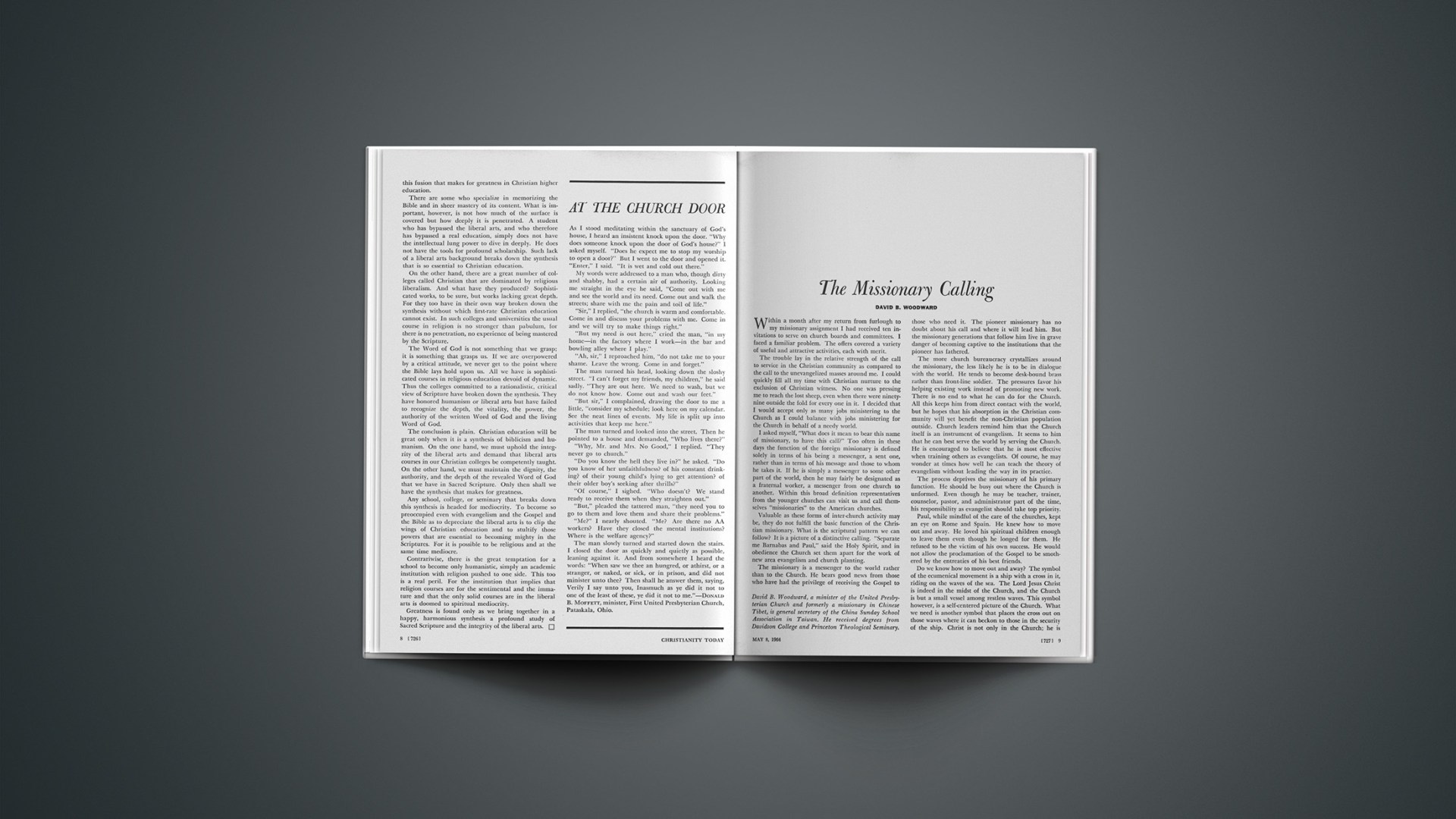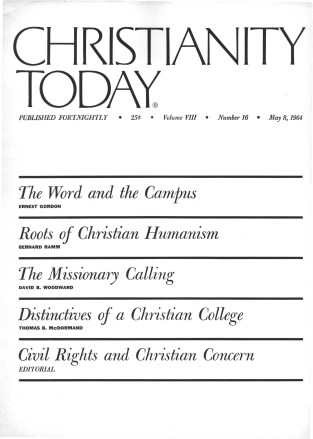Within a month after my return from furlough to my missionary assignment I had received ten invitations to serve on church boards and committees. I faced a familiar problem. The offers covered a variety of useful and attractive activities, each with merit.
The trouble lay in the relative strength of the call to service in the Christian community as compared to the call to the unevangelized masses around me. I could quickly fill all my time with Christian nurture to the exclusion of Christian witness. No one was pressing me to reach the lost sheep, even when there were ninety-nine outside the fold for every one in it. I decided that I would accept only as many jobs ministering to the Church as I could balance with jobs ministering for the Church in behalf of a needy world.
I asked myself, “What does it mean to bear this name of missionary, to have this call?” Too often in these days the function of the foreign missionary is defined solely in terms of his being a messenger, a sent one, rather than in terms of his message and those to whom he takes it. If he is simply a messenger to some other part of the world, then he may fairly be designated as a fraternal worker, a messenger from one church to another. Within this broad definition representatives from the younger churches can visit us and call themselves “missionaries” to the American churches.
Valuable as these forms of inter-church activity may be, they do not fulfill the basic function of the Christian missionary. What is the scriptural pattern we can follow? It is a picture of a distinctive calling. “Separate me Barnabas and Paul,” said the Holy Spirit, and in obedience the Church set them apart for the work of new area evangelism and church planting.
The missionary is a messenger to the world rather than to the Church. He bears good news from those who have had the privilege of receiving the Gospel to those who need it. The pioneer missionary has no doubt about his call and where it will lead him. But the missionary generations that follow him live in grave danger of becoming captive to the institutions that the pioneer has fathered.
The more church bureaucracy crystallizes around the missionary, the less likely he is to be in dialogue with the world. He tends to become desk-bound brass rather than front-line soldier. The pressures favor his helping existing work instead of promoting new work. There is no end to what he can do for the Church. All this keeps him from direct contact with the world, but he hopes that his absorption in the Christian community will yet benefit the non-Christian population outside. Church leaders remind him that the Church itself is an instrument of evangelism. It seems to him that he can best serve the world by serving the Church. He is encouraged to believe that he is most effective when training others as evangelists. Of course, he may wonder at times how well he can teach the theory of evangelism without leading the way in its practice.
The process deprives the missionary of his primary function. He should be busy out where the Church is unformed. Even though he may be teacher, trainer, counselor, pastor, and administrator part of the time, his responsibility as evangelist should take top priority.
Paul, while mindful of the care of the churches, kept an eye on Rome and Spain. He knew how to move out and away. He loved his spiritual children enough to leave them even though he longed for them. He refused to be the victim of his own success. He would not allow the proclamation of the Gospel to be smothered by the entreaties of his best friends.
Do we know how to move out and away? The symbol of the ecumenical movement is a ship with a cross in it, riding on the waves of the sea. The Lord Jesus Christ is indeed in the midst of the Church, and the Church is but a small vessel among restless waves. This symbol however, is a self-centered picture of the Church. What we need is another symbol that places the cross out on those waves where it can beckon to those in the security of the ship. Christ is not only in the Church; he is also in the world. He calls to us, and this is a missionary call. It is not at all comfortable or easy. It means getting out of the ship and walking on the water. This no one can do without his eyes on Jesus.
The missionary may have some misgivings as he sits in the boat and urges young national Christians to go out and walk on the water. He is likely to vent his dissatisfaction by blaming the Church. Actually, if he is drawn aside from his main task, if he neglects his call, he has himself to blame. The missionary is not called primarily to be a supervisor, a caretaker, or an adviser behind the scenes. His is the call of the pioneer. He has a call to the unimagined, to the untried, to the unfinished. When he is deflected from evangelism, when he submits to a crushing load of organizational minutiae, whose fault is it? His very own. It is up to him to maintain, meekly but firmly, his integrity as a prophet. He must not forsake his calling.
But are all missionaries called to be evangelists? I have been using “missionary” as a generic term and defining it in terms of aggressive evangelism. Is “aggressive” a bad word for a soldier of Jesus Christ? One can be aggressive and still be sweet about it, as Paul was before Agrippa!
Of course, some missionaries do not fit the category of evangelist but still contribute largely to the evangelistic efforts of others. And evangelism is not confined to missionaries. Some pastors in highly organized churches are imaginative pioneers and masters of soul-winning. Nevertheless, there is a missionary type, a unique missionary gift recognizable in the Church.
God be praised that we have men who are church planters, others who are church builders, and even those who are church preservers. The current emphasis on the Church as mission blurs the varied gifts and callings in the Church. Some men are called to be missionaries. That is where they are most at liberty in the Spirit. These men and women do not require a ready-made parish, for the world is their parish.
It is strange that in those parts of the world where the Church is numerically weakest, we often see this type of person discounted in the work of church extension. Foreign missions are urged to come under the supervision of the younger churches; but do they thereby become integrated into corresponding bodies, the local national missions? Are the missionaries joined together with national workers of similar gifts and purpose? Not always. They are more likely to be assigned to established work than to new endeavor. They are apt to be told, and to accept the assumption readily, that national workers make better evangelists.
Young missionaries are particularly susceptible to these views if they are surrounded by mature, well-trained national Christian workers. It is healthful for them to have an inferiority complex provided that it does not lead them to mistrust the power of the Holy Spirit. He is no respecter of persons. He can use even a missionary.
The greatest confusion about the function of the missionary does not lie in the minds of the leaders of the younger churches or in the minds of board secretaries in the home lands. It is in the minds of missionaries themselves. Is their attention fixed on the unfinished task? If they know their calling, they can speak a prophetic word to the Church at home and abroad about the lost of this world. Also, as prophets to men under judgment they can declare the message of salvation.
The missionary movement of the last century has been prophetic both within and without the Church. In its relation to the priestly, pastoral core of the Church, it has maintained a relatively happy balance. This working partnership will continue as long as the missionary is willing to say, “The Lord is calling me to walk out on the water to him,” while the minister both at home and abroad replies, “Go; you have my blessing.”
The Uncommitted
In the deep wood, no road,
on the dark sea, too many stars,
through old and new ways faring,
without direction, mapless,
wanders the untrammeled mind.
Pale in the west, the sickled moon
after the bright sun’s dying,
faint the perfume of the fading rose
and red as blood the dogwood leaf
when beauty touches the unsuspecting heart.
But what is beauty? What is good?
Who are the guilty? What is truth?
A wrinkled brow, a knowing shrug,
a sleepless night perhaps,
and then a little washing of the hands.
Twisted vine and upper room and olive grove
recall nothing to the mind;
Golgotha and the Emmaus road
bring neither tear nor burning,
and the white moveless stone Pieta
impresses only as a work of art.
Is it not wiser to withhold judgment,
to withdraw the hand, avert the eye,
to keep the head unbowed, the knee unbent,
to walk into the Shadow companionless,
still testing all things and committed to nothing?
JAMES WESLEY INGLES
David B. Woodward, a minister of the United Presbyterian Church and formerly a missionary in Chinese Tibet, is general secretary of the China Sunday School Association in Taiwan. He received degrees from Davidson College and Princeton Theological Seminary.










